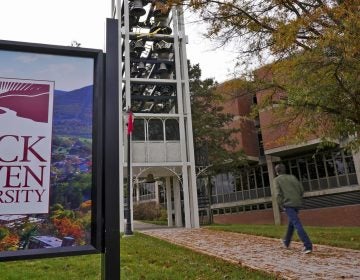Report urges consolidation, other drastic measures to fix PASSHE
State System of Higher Education spokesman Kenn Marshall said they're committed to a redesign, but some of the drastic changes aren't feasible.

Shippensburg University is one of the 14 schools that make up the troubled Pennsylvania State System of Higher Education system. (AP photo)
A group of independent researchers has released a report recommending dramatic changes to Pennsylvania’s public higher education system — including consolidating or totally reorganizing the 14 state-owned universities.
The legislature commissioned the study by public policy research group the RAND Corporation in response to years of mounting difficulty keeping universities in the system open. Rapidly changing demographics, declining enrollment, and stagnant state funding have all played a role in the problem.
RAND Senior Economist Charles Goldman said his team sees five possible solutions.
For one, he said they could ramp up the bureaucratic changes the state is already making by, for instance, reducing political influence on the Board of Directors and eliminating the system’s Council of Trustees.
However, he cautioned that RAND doesn’t think “that option alone is going to be sufficient to address the long-term challenges.”
That’s where the more drastic measures come in. The report recommended merging certain universities by region; converting the whole system into a few state-related universities, similar to Penn State; putting the whole state system under management of an existing state-related school; or merging the entire state system fully into a state-related school.
Goldman said that if changes don’t happen, “the long-term challenges facing the system … are going to continue to stress the system, and we think the system is going to continue to struggle.”
State System of Higher Education spokesman Kenn Marshall said they’re committed to a redesign, but some of the drastic changes aren’t feasible.
“It doesn’t make a lot of sense for students, really,” he said. “You know, higher costs, fewer options. That’s not where, I don’t think, anyone wants to go.”
He added, “we believe it’s appropriate to keep the system in place, to keep all 14 universities in place.”
The House and Senate Education Committees are holding a joint hearing next week to discuss the report’s findings.
WHYY is your source for fact-based, in-depth journalism and information. As a nonprofit organization, we rely on financial support from readers like you. Please give today.




